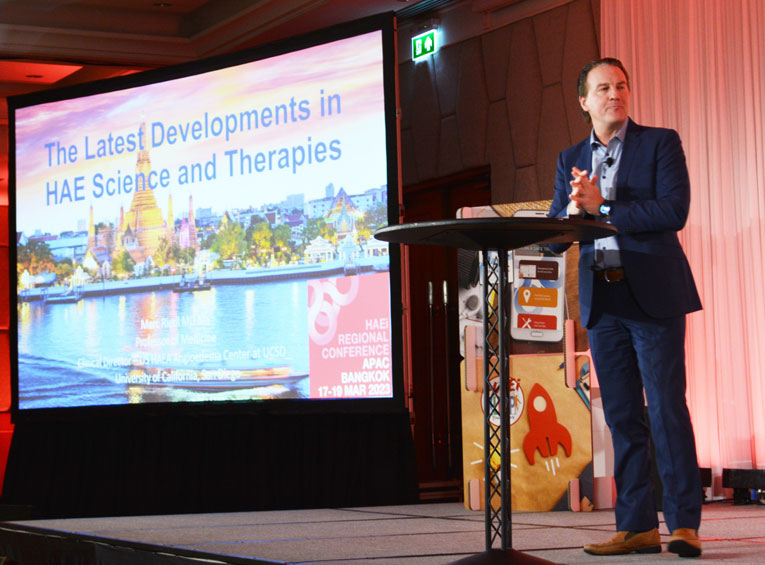This article is taken from an extensive feature on the 2023 HAEi Regional Conference APAC, published in Global Perspectives #1 2023
Professor Marc Riedl from the University of California San Diego, United States, then took the stage to provide an update on developments that affect the HAEi Community.
Professor Riedl began his talk by emphasizing the need for continued efforts to raise awareness of HAE among physicians and patients. He pointed out that making the HAE diagnosis requires people to have enough knowledge to think about it when trying to figure out the cause of a chronic swelling condition.
Moving on to describe new treatments on the horizon that are at various stages of clinical development, Professor Riedl discussed details regarding:
- Four medicines for HAE prophylaxis delivered by subcutaneous injection
- CSL Behring’s Garadacimab, phase 3,
- Ionis Pharmaceuticals’ Donidalorsen, phase 3
- Astria Therapeutic’s Star 0215, phase 1B/2, and
- ADARx Pharmaceuticals’ ADX 324, phase 1.
- Three orally administered medicines
- Kalvista, sebetralstat for on-demand treatment, phase 3
- Pharvaris
- PHVS 416 for both on-demand and prophylaxis, Phase 2
- PHVS719, an extended-release tablet for prophylaxis, Phase 1
- Two gene therapy treatments
- Intellia Therapeutics’ NTLA 2002, phase 1/2
- BioMarin Pharmaceuticals’ BMN 331, phase 1/2.
Prof. Riedl stressed the need for continued clinical development efforts and answered the fundamental question of “Why Does it Matter” by sharing a quote from the HAE Patient-Focused Drug Development meeting held at the FDA several years ago:
“The unpredictability of the disease is stressful, and it limits educational and employment opportunities as well as disrupts social activities, and has a negative impact on family relationships. A higher frequency of attacks is associated with a higher burden of disease, just as there can be an impact on the patient’s quality of life in between episodes. Despite advances, the burden of disease remains high.”
Dr. Riedl closed his talk by addressing what he would like to see as a model for patient/physician interactions. He believes HAE management plans should be based on an open discussion with the treating physician. In addition, they should be designed around an understanding of how HAE affects a patient’s emotions, work, school, relationships, travel, exercise, hobbies, and family planning. Professor Riedl added that management plans should be dynamic and updated as life circumstances change.
Find more feature articles from the 2023 HAEi Regional Conference APAC:











